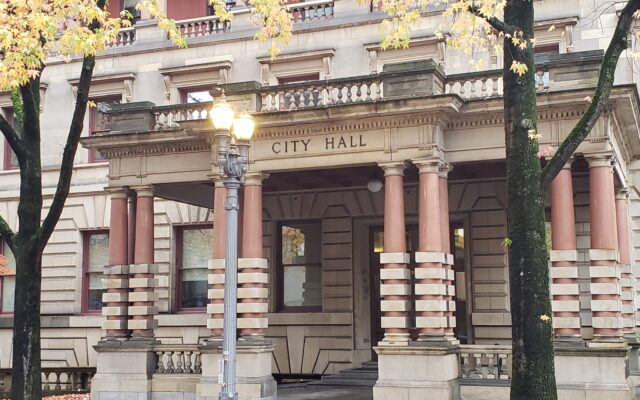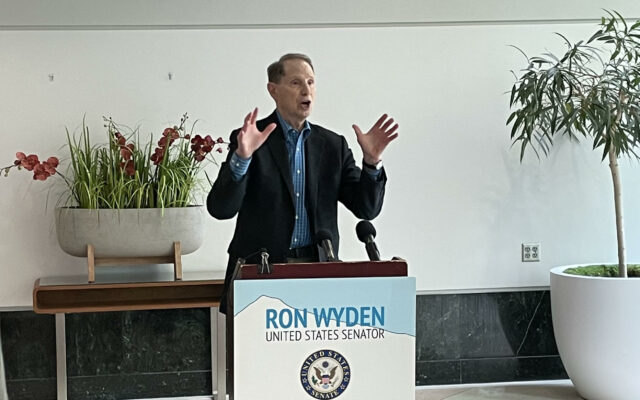Changes To Charter Reform Put On Pause

Portland, Ore. – Just two days after a lively debate during a Portland city council work session over three proposals to change the voter-approved amendments to the city’s charter, Commissioner Dan Ryan says he will not bring forth a vote to get those proposals on the November 2023 ballot. Though it appears he did not rule out trying for the May 2024 ballot.
With members of the charter commission, government transition team, salary commission and independent districting commission all racing to meet the necessary deadlines to ensure Portland’s new form of government can be implemented with ease come January 1st 2025, the proposals brought forth by Commissioner Ryan and Rene Gonzalez received backlash for rushing through the process and the appearance that they’re skirting voters, as the charter amendments on the November 2022 ballot received almost 60% of support from voters.
Prior, Commissioners Gonzalez and Ryan held a city work session on July 18th to give a presentation on their proposed changes to the charter in an effort to bring to light the informal discussions and concerns city leaders have around some of the changes included in the charter reform. Ryan recognized all the hard work being done to make these monumental changes to how Portland’s government works, but went on to say “this a chance to hit a pause and get this right.” Claiming many Portlanders didn’t like that all the charter reform amendments were lumped together and this could give voters the chance to decide on each piece one by one.
Their proposed amendments include giving the mayor veto power, reducing the new city council to eight members instead of 12, and changing the style of ranked choice voting the city will use.
“I want to be crystal clear at the kickoff, this is not to undo Ballot Measure 26-228. All of this is to focus on what tweaks we might make to ensure better implementation and a more effective government come 2025,” Gonzalez said to kick off the discussion. “Also, we’re a little bit on the clock. Candidates will start filing for 2024 very soon. This is probably our last chance before 2025 to really have a deep discussion.”
Commissioners did not vote on any proposal during the session, and the proposed changes would need support from 3/5s of the council to get on the ballot.
Mayor Ted Wheeler was unable to attend the meeting, but while riding in the back of a car he shared the same sentiment as a number of protestors who marched out front city hall ahead of the meeting, that Ryan and Gonzalez are circumventing the will of the people.
“We always have the opportunity to bring charter changes forward. We have not even yet implemented what the voters have asked for and yet we’re already proposing we go back to the voters with changes,” Wheeler said. “At the end of the day, the question for me is do we trust the will of the voters, or don’t we? And even though I don’t uniformly like the outcome of the last election, it was the clearly stated will of the voters. The concerns we’re raising today, are concerns that were well vetted.”
Others expressed concern over the speed at which these changes were being introduced. Before 26-228 made it to the ballot there was years of research and work that went into deciding which changes would best suit Portland. And then these proposed changes underwent months of discussion and coverage in the media.
“There was so much time and effort to engage the community and to educate the public about the charter amendments when they were proposed. Plus the vote happened during a very high turnout election. And now, to bring forward at the last minute three changes without as much time to review, or without any review process, that strikes me as worrisome,” expressed Alan Durning with the independent, nonpartisan, nonprofit think tank, the Sightline Institute.
Candace Avalos, a member of the charter commission that was invited to give testimony and answer any questions commissioners had, mentioned that it seems nefarious that city leaders are racing to get this done with little feedback from the public. And then to put it on the ballot of an election year with historically lower turnout.
“While yes it is true that you all cannot just simply make changes to the charter and have it implemented, you do have the power of which election to put it on. And that does effect who does come out to that election,” Avalos said, mentioning that odd year, non-presidential elections often see much lower turnout.
Mike Alfoni, with Oregon Ranked Choice Voting was invited to testimony, and was curt with his words on any possible changes to the proposals that a large group of bureaucrats, volunteers and government staffers are already in the process of figuring out how to implement.
“It doesn’t matter what the proposal is, it’s going to be an absolute mess.” He was one of many that raised concerns that the changes laid out in the ballot measure were specifically crafted to work with one another, and changes to them could disrupt their desired function.
After initially blocking the public from viewing the session (later changing that decision) Gonzalez and Ryan continued on with their presentation, beginning with Mayoral Veto Power:
Under the current changes to the city’s charter the mayor is primarily tasked with overseeing the city manager and budget, and would not have veto power. Instead they will only vote along side city counselors in the case of a tie break vote. Ryan pointed out that this is not only abnormal but alluded to the idea that some counselors, who could theoretically be elected with only 6% of the total city-wide voting base, would have more legislative power than the mayor.
“Mayor veto power and council override serves as a necessary checks and balance to decisions facing Portlanders,” Ryan said. “This isn’t a foreign concept for city government. New York, Los Angeles, Chicago, Phoenix, San Diego, Philadelphia and many more cities have this structure.”
This is when Avalos, along with another member of the charter commission that voted against the changes brought forth to voters, were asked to make testimony and answer questions. Avalos said they ultimately opted against veto power because “we believe that a veto on top of the tie breaking vote would over balance the checks and balances between the executive and legislative authorities.” Adding, that during their listening sessions with the public, one of the most common things brought up was the mayor having too much power. Going on to say, the whole idea behind having 12 counselors was to sort of force the two branches of government to work together
“It’s important to the people that a counsel represented by all the neighborhoods can have power, and negotiate that power with the mayor. The mayor already has a lot of oversight, like being able to manage the chief administrative officer, which is going to oversee all of the bureaus. Even though there’s going to be a much more shared responsibility of the budget between the two, the mayor will still have a weighted power,” Avalos said. “We felt that we were giving the mayor significantly more power than they currently have to oversee the operations of the city, and we wanted to balance that with a council that wouldn’t have a mayor overrule everything that they do.”
But the dissenting voice, David Knowles, said giving the mayor veto power would only be a minor tweak to the charter and sees the mayor as having the unique perspective of being the only city-wide elected official.
“Our concern was that the council would adopt a policy or make budget decisions that the mayor is not capable of implementing,” Knowles said. “Only the person with the unique responsibility for managing the budget can weigh all those different concerns.”
Mayor Wheeler concluded the dialogue on veto power by saying while he does strongly support veto power for a future mayor, he says the tool is hardly used across the country and that “the mayor has the bully pulpit first and foremost.”
Then in a bit of an awkward moment, after Wheeler scolded Gonzalez and Ryan for proposing changes to the charter, neither responded and moved on to the next topic of lowering the number of city counselors from 12 to 8:
Gonzalez kicked this section of the meeting off by having one of his staffers read a letter into the record from Amy Wood with the Government Transition Advisory Committee over concerns of how much implementing this new form of government will cost.
“Look at the cost of 12 commissioners, increased staff, and an upgrade to city hall. No one seems to acknowledge the true cost of this expansion from four commissioners to 12. Meanwhile the Portland Bureau of Transportation anticipates a $32 million shortfall next year. Portland literally cannot afford some of the escalating costs of this transition,” the letter wrote.
Gonzalez echoed the issue of cost, but mainly in the form of how the city will be able to continue its Small Donor Elections Program that helps grassroot campaigns in races against Super PACs.
“I am deeply concerned that if we put on contribution limitations that are small on candidates, and don’t provide an alternative mechanism for them to finance their campaigns, that they will always be outgunned by independent expenditures,” Gonzalez said expressing concern that there are no limits on how much an IE can spend. “Our ability to finance or support the campaigns of so many candidates is in real question.”
Commissioner Mingus Mapps stepped in to agree with Gonzalez, saying its reasonable that nearly 120 people could run for office if there’s 10 candidates per seat. Gonzalez called on the Director of Small Donor Elections, Susan Mottet to speak. She gave conflicting answers over whether the increase in council seats will hurt the program, or whether dropping down to eight positions would even help.
“Increasing council size from four to 12 represents an increase in cost to the program, but then a number of factors decrease the cost of running for office because they’re not running city wide, but instead in districts,” Mottet said, reminding counselors that this new form of government does away with primary elections. Another cost saver. “Roughly, it should be around equal to the prior cost of the program in the long term.”
Though she added, because all 12 candidates will be running in 2024, and not half of them like the current system, there could be an increase of about $4 million for the city in the short term.
Ryan didn’t waver in his stance on the issue, firmly stating “we don’t have enough money to pull this off and we can’t assume we’ll have this money in the fall bump.”
Before moving on, Mapps mentioned, two possible ways to save money could include pausing the city hall renovations and lower the salary of city counselors.
The presentation ended with a discussion on Ranked Choice Voting:
From the moment it was learned that Portland would be utilizing what’s called Single Transferable Vote ranked choice voting, critics claimed the method is too confusing. Gonzalez and Ryan suggested switching to what Multnomah County will use, Instant Runoff ranked choice voting.
Gonzalez asked Alfoni, mentioned above, to answer some questions about ranked choice voting and to explain HB 2004, which was recently passed by the state legislature. But after that, Alfoni’s testimony did not seem favorable to the two commissioners efforts to adopt a new form of ranked choice voting.
“Both the charter review process and the statewide HB 2004 process were years in the making involving dozens of people ensuring these things worked well. A multi-week process by a small group in City Hall attempting to put something on the ballot is very dangerous” Alfoni said. “The timeline is too short to recommend substantive changes to both the voting method, the districts and number of counselors because these are all interrelated, and should one of these things pass at the ballot it could throw the whole system out of wack either legally or politically.”



